If 7 Wonders Duel strategy had a mantra, it would be “I don’t want this, but I’m going to take it anyways because you need it.” In a game where military is just a token that you slide, this is a surprisingly combative game. Every single choice you make, you second guess because what it might let your opponent do. So, instead of doing what you want, you do whatever hurts your opponent the most.
In this guide, I’m going to walk you through each of the ways you get to screw over your opponent, the best ways to really put it to them, and maybe discuss some 7 Wonders Duel strategy talk too, I guess. If you’re looking for my guide on 7 Wonders, check that out too.
Wonder Drafting Strategy
In 7 Wonders Duel, you start the game by either randomly dealing out 4 wonders to each player, or by drafting them. I highly recommend drafting them, since it gives you so much more strategic freedom.
And in light of that, I’m going to list the Wonders from roughly the strongest to the weakest, and what situations or strategies makes them better or worse.
1. The temple of Artemis
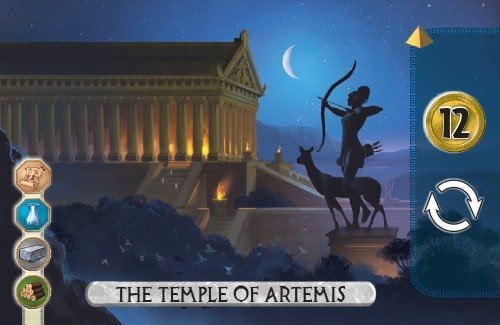
The wonders that give you an extra turn are just the best wonders, hands down. When so much of the game is about getting the good cards while your opponent is forced to take the bad ones (sorry, science and military, you’re not great in this game), taking two turns in a row completely changes the dynamic of that.
When your card selection would reveal a card you don’t want your opponent taking, you use one of these extra-turn wonders, and all of the sudden, you can take that card instead. It is really the sole means of controlling the flow of the game.
Typically the downside of building a wonder is that building it, especially when you built it early, can cost a lot of money. However, this one completely mitigates that risk by awarding you with a zillion money (so much money that you are probably never going to run out after building it, you might even consider starting a charitable endowment with it).
Not only that, but 12 gold is so much that you can easily play a resource light game, if you can manage to take the gold discount trade cards in the first age.
2. Piraeus
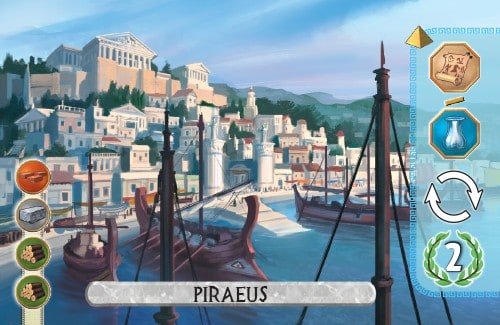
This guy gives you the manufactured goods for free, which is pretty great. Especially since that means you can focus strongly on the other resources in the first age.
One thing to note about this guy is that its the only wonder that doesn’t cost any manufactured goods to build, and is the easiest to build (by a good bit, actually). This is one wonder that you can expect to pay little to no money for, which is great, since this is the only extra turn card that strongly incentivizes you to built it in the first age.
3. The Hanging Gardens
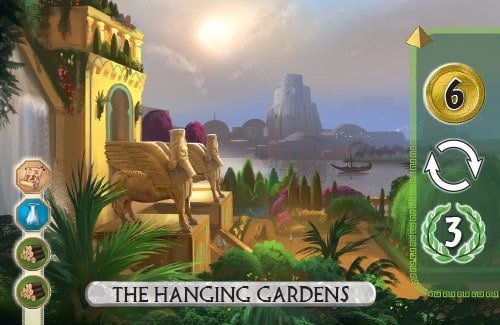
While its usually better for a card to give you a lot of one thing, giving a bit of everything is still quite powerful. If you build it early in the first age, it’ll give you more than enough money to recoup your losses, some points, and an extra turn to boot.
4. The Sphinx
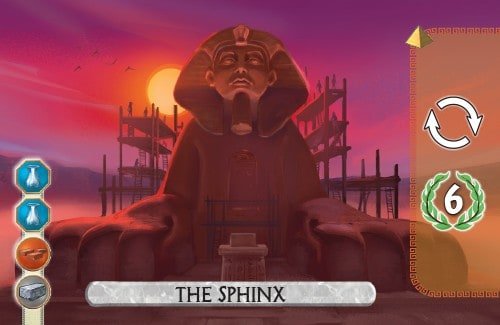
Solid. Solid. Solid. This card is great, since extra turns are great and 6 point is nothing to laugh at.
5. The Appian Way
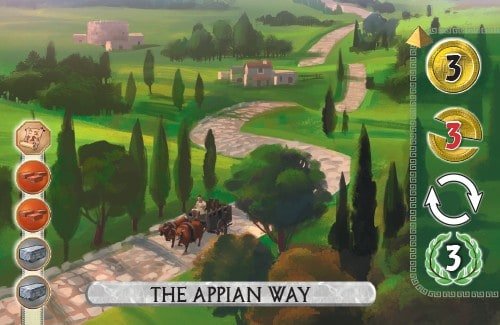
The only reason this card isn’t higher is that the 3 coin loss is only good in some situations, and not necessarily the situations when you’re going to want to pop an extra turn. But when it’s good, it’s among the very best wonders.
6. The Great Library
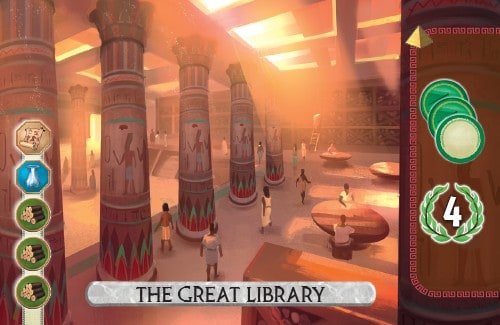
Of all the wonders, I’m fairly positive this wonder is the best wonder that doesn’t allow you to take an extra turn. However, this wonder is almost the most situational, and luck-based. There are only a handful of progress tokens that are always good, and quite a few that are underwhelming if they don’t directly help your current strategy.
This ranks so highly partly because it enables you to get a super early economy token (Economy: You gain the money spent by your opponent when they trade for resources), which is just gamebreaking. The science tokens are not meant to be gained so early (there are only one of each science symbol in age 1 and 2).
If you look at the tokens that are out this game, and if 3/5 of the tokens that aren’t included will help your current strategy, this one can be a slam dunk. If the generically good tokens are all in the game, pass it up. I’d look for a few of these not being in the game:
- Economy: You gain the money spent by your opponent when they trade for resources.
- Agriculture: Immediately take 6 coins from the Bank. The token is worth 4 victory points.
- Urbanism: Immediately take 6 coins from the Bank. Each time you construct a Building for free through linking (free construction condition, chain), you gain 4 coins.
- Others are more situational, but still worth considering.
Each of those make this an above average wonder. If 3/5 of the tokens out of the game are good for you, its a slam dunk.
7. The Pyramids
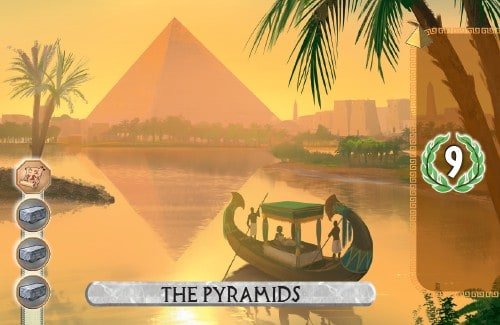
This one is just good. When games are always pretty close, settled by 1-15 points typically, a 9 point jump can often just win the game.
Do be careful though, getting 3 of a resource can be a challenge. Keep an eye out for the Stone Reserve (Stone Reserve: Change the purchase price of stone to 1 gold) if you get this wonder.
8. The Great Lighthouse
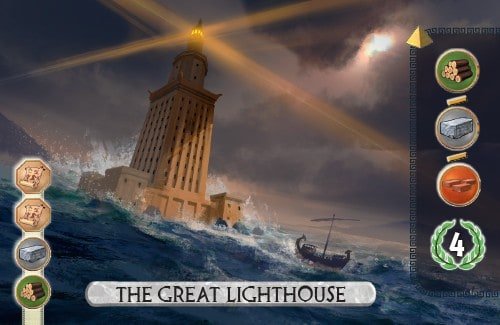
This is one of the best wonders to build as early as possible. You get a solid resource lead, make it very hard for your opponent to keep you off anything you need, and scores some points to boot. It’s not bad, and it certainly limits the ways your opponent can attack you.
However, the Piraeus is much better, as it comes with free resource generation and an extra turn.
9. The Mausoleum
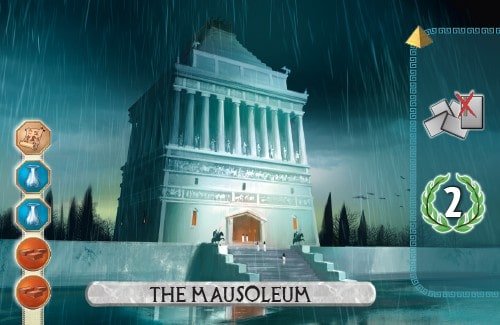
Now, it really hurts me to put this card so low, since its also situationally quite powerful. If your opponent is trashing cards you want to take: this card lets you build them anyways.
Now, this is severely limited by the race aspect of the wonders (where only 7 can get built total), since this card will be at its most powerful in age 3, and you may not get to build it if you wait too long.
The most interesting thing this card does (similarly to The Great Library), is allow you to get a progress token without a heavy investment into science. If a few science cards get trashed in the first age, (which should probably happen pretty frequently), you can build its second age match, then build this wonder to get a progress token at a pretty low investment. Even if you just take the philosophy token (Philosophy Progress Token: Score 7 points), that’s 7 vp for the token, 2 for the wonder, and 2 for the science cards themself (all the age 1 and 2 science matches score exactly 2 points).
But an early progress token is unfortunately the most powerful thing this can do, unless you’re gunning for military or scientific supremacy, in which case this card becomes one of the best wonders in the game. This card will typically represent extra military or science symbols in that case.
However, when you use this card to build an age 2 resource card, or a random civilization building, it is deeply underwhelming.
10. Circum Maximus

So, this card will rarely do something powerful. You can destroy a manufactured good, which is occasionally going to be powerful, depending on the game state in the second age of the game.
The situation where destroying a manufactured good is powerful is when:
- Your opponent doesn’t have Piraeus.
- They couldn’t grab one of the gold manufactured good cards
- You have one or more of a manufactured goods (so it costs extra money for them to buy it)
Far more often though, hopes of making a monopoly just don’t pan out. Be on the lookout for them, but don’t expect it to happen easily.
However, with only 4 cards that produce either manufactured good (compared to the 5 cards that produce each resource), a monopoly on a manufactured good is much more likely.
10. The Statue of Zeus
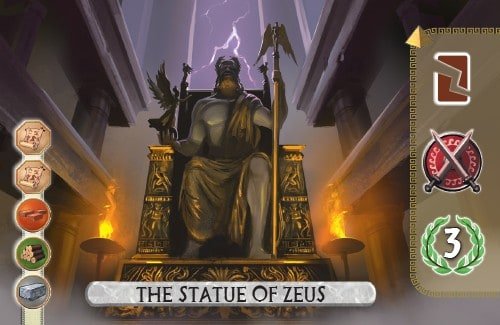
More often than not, this card is the same story as the card above, only it’s even less likely to be good, since there are more resource cards.
12. The Colossus

This card is obviously great if you’re gunning for a military supremacy win, as its two military that your opponent can’t stop. The threat of building it may even change the way your opponent plays, to your benefit.
However, the chances of a military win are slim to begin with. And on top of that, in most games, this card only does one relevant thing: in the games where you’re trying to win with military, the points don’t matter much. In the games where you’re trying to win with points, the military will maybe score you 2-3 points from pushing you further into your opponent’s territory. 6 points for a wonder is not a good deal, and that’s the best case scenario in most games.

Drafting Stategy: How to Draft in 7 Wonders Duel
If I had to summarize drafting priorities in a few points:
- Take Blue cards over anything in the second age, and over anything not worth more points in the third.
- Don’t take science and military cards when you have other options (or unless you already have a matching science card). They’re just too hard to win with and not that powerful otherwise.
- Don’t be shy about trashing cards for money or buying the gold cards. Both things are actually really good in this game.
When drafting the cards, you always need to pay attention to what your choice will reveal to your opponent. If that card is better than the card you’re taking, is it possible to take something different? Is it possible to use an extra turn wonder instead?
Likewise, revealing face down cards is usually a bad thing, and you should avoid it whenever possible. If your pick reveals several face down cards, consider a different pick, or using an extra turn wonder to get first dibs on the flipped cards.
The opponent will always have a choice, but you can frequently guess what they’d like to do. If you can plan out their turns and your own, you can figure out who is on pace to get the good cards! For example, in the third age, its all about the guild and blue cards (unless someone is gunning for a supremacy win). If you can use your extra turn wonders to get them, or force your opponent between choosing a card they’d like to get or the guild card, its usually a good idea.
Monopolies
In this game, it can be a powerful strategy to get all of the resources of a specific type, forcing the opponent to pay tons of money for that resource (since the cost goes up by one for each brown/grey card you have that makes that resource), severely limiting what they are capable of buying.
From my experience, it can be difficult to get a monopoly, even with a wonder like the Circum Maximus. However, if early in the second age, your opponent still can’t produce a resource, see if you can steal it all up.
This is significantly easier for manufactured goods, as there are only 4 cards in the entire game that make each of those, compared to the 5 cards from the brown resources. If one gets discarded in the first age, it actually becomes quite easy, so always pay attention to what cards don’t get flipped by the end of the first age.
People often give up on the idea of a monopoly when the opponent gets a single resource of that type, but there are lots of double costs. If the opponent is short on money/yellow cards, remember there are lots of double costs (and stone in particular has a handful of triple costs). But if they’re not struggling with money, giving up on a monopoly is probably best.

Science and Military
Most games will not be decided by Science or Military. Generally, you don’t want to take them, unless you’re positioned to go for a supremacy win.
If your opponent is trying to win with them, you can ignore the first age science and military cards without getting punished for it, but come the second age, you’ll want to do what you can to prevent your opponent from getting a progress token with science, or too far down the track with military. Remember that military cards in the third age can move you forward by 3 at a time, so you want to stay at least 4 spots away or you have a chance of randomly losing if you ever flip a military card. If you’re ever less than 4 spots away, taking a military card should be your highest priority.
However, when your opponent isn’t threatening a military victory, any time you have to take a military card, you should consider trashing it for gold, unless the opponent is short on money. Especially consider trashing them in the first era, when you only get a single military symbol, and especially if it will cause you to go second in the next round.
Scientific supremacy is even harder to achieve than military supremacy. However, the progress tokens are quite powerful to make up for it.
If your opponent is aggressively building science, even if you ignore every single science card, until they’re one card away from winning with scientific supremacy, they’re still not going to get there as often as not, simply because the science victory requires a lot of luck. Of course, don’t let the opponent get progress tokens if you can stop them, but I won’t take new science symbols until they have 4 or 5, depending on the age.
Science does have more play to it than that though: getting a quick progress token is great. If you can afford to take a few science tokens here and there on the chance that you match one, it’s not the worst play, especially if it ruins a few of your opponents turns when they prevent you from getting a progress token. However, its super luck dependent that you’ll get the chance to get a matching symbol. There just aren’t many matching sets.

Gold Cards
People always underestimate the gold cards in this game because they aren’t very attractive in the original 7 Wonders, but they’re really powerful here.
In the first age, the cards that reduce the price of resources from the bank are mostly just better than the matching resource cards, especially if you have a wonder that makes gold. It’s a good idea to stay above 3 money in the first age, just so you can get one if its flipped.
But honestly, all the gold cards are great.
Because the game is filled with science cards and military cards that will only rarely help you win, trashing those cards for gold is quite a frequent play. Discarding a card for gold will happen more frequently than in 7 Wonders, but it shouldn’t feel like a losing play. Because each gold card increases how much gold you can trash a card for, it becomes powerful to stack as many as you can.
It’s a valid strategy to go for gold cards over the resource cards (for the most part), as gold scales well this way, and there are gold cards that negate the value of an opponent’s monopoly. Obviously, you still want a few resource cards, but don’t be afraid to lean into the gold cards too.
Blue Cards
Blue cards are the bread and butter of this game. They’re worth fighting over, especially in the third age, and they are consistently the bulk of your points. Unless you’re going all in on scientific supremacy or military supremacy, once you get to the second or third ages, take these cards above everything but a resource you won’t easily be able to get later on or a guild card that’s wore more points.
They’re not exciting, but they win games.
How to get a scientific supremacy win
This starts at the wonders. You want to get the Mausoleum. Additionally, you want to get wonders with extra turns, and wonders worth money. The VP wonders aren’t as exciting for you.
You also want the Law Progress Token out (Law Progress Token: counts as a symbol for scientific supremacy). Without the Law Progress Token and the Mausoleum, you’re deeply relying on a lot of luck. With them, you have a pretty decent chance.
Try to build your wonders late, so you can get access to your wonders in the third age. In that age, there are two new science symbols, and there are two of each of them, so hate drafting in the third round will often be too hard to pull off, especially if you still have an extra turn wonder left to build.
How to get a military supremacy win
Military Supremacy is easier to get than scientific supremacy. The Mausoleum is once again great, so is the Colossus. When you build, pay attention to how much money your opponent has, since keeping the opponent low on resources is the secret strength of military.
If an opponent can’t afford to build military, that makes your military cards much more effective. You’ll want to aggressively take wood and brick on the chance that your opponent won’t be able to build the later military cards themself.
If you build the Colossus right before or after taking a 2 or 3 shield card, or before your opponent is forced to flip a few cards, your opponent often won’t have a chance to counter-play it by taking military themselves. You just have to find the right moments to lean into luck.
Thanks for reading 😉
I loved writing this guide: 7 Wonders Duel strategy is such a fun topic, so much to explore and think about.
I was considering a pick order for all the cards in the game. I suspect the game is too simple for that, but let me know if you’re interested.
Also let me know if you disagree with anything in this guide, or if you have anything to add in my Discord channel. I’m willing to test/discuss anything in this document. I’d like for it to be a living document.
Thanks for reading.



The BGG forums are rife with users claiming that the first player advantage is pretty overwhelming, which seems odd to me in that 7WD is all about timing and making use of strong Wonders, as you point out. So, two questions for you:
1. Do you track who is first player in your games and what’s the win rate if so?
2. What is your opinion of the expansion that helps mitigate the zugzwang of the base game?
Thanks for the fun write-up. I’ve gotten a lot of hours of enjoyment out of 7WD but never taken such a deep dive on the game.
1. I don’t have data on that, but it certainly feels pretty big.
2. It’s excellent! I don’t own it, but if I did, I probably would stop playing the base game and only play the expansion.
Great guide. Really appreciate it!
Fantastic guide. Really helped!
Great guide, one of the best written out there. Love the point about using Mausoleum to score back a science token for science win
It’s great stuff and actually the only one strategy guide for 7WD that I’ve found.
Thank you for your shening. I am worried that I lack creative ideas. It is your enticle that makes me full of hope. Thank you. But, I have a question, can you help me?
АБС абс датчик играет ключевую
роль в безопасности торможения автомобиля.
Buy gift ozon card paypal card BH.
Local.
I don’t think the title of your article matches the content lol. Just kidding, mainly because I had some doubts after reading the article.
Thank you for your sharing. I am worried that I lack creative ideas. It is your article that makes me full of hope. Thank you. But, I have a question, can you help me?
Thanks for sharing. I read many of your blog posts, cool, your blog is very good.
I don’t think the title of your article matches the content lol. Just kidding, mainly because I had some doubts after reading the article. https://accounts.binance.com/ka-GE/register-person?ref=ILE8IH9H
Your article helped me a lot, is there any more related content? Thanks! https://www.binance.info/register?ref=IHJUI7TF
rtg pure
References:
https://kidsstorie.com/max-and-mias-train-ride-through-time-travel-stories/
where can i purchase steroids
References:
notes.io
grand casino mn
References:
https://www.fashion-insider.de/96378/wohnraum-trifft-mode-wie-interior-design-deinen-persoenlichen-stil-praegt
medical uses for steroids
References:
raindrop.io